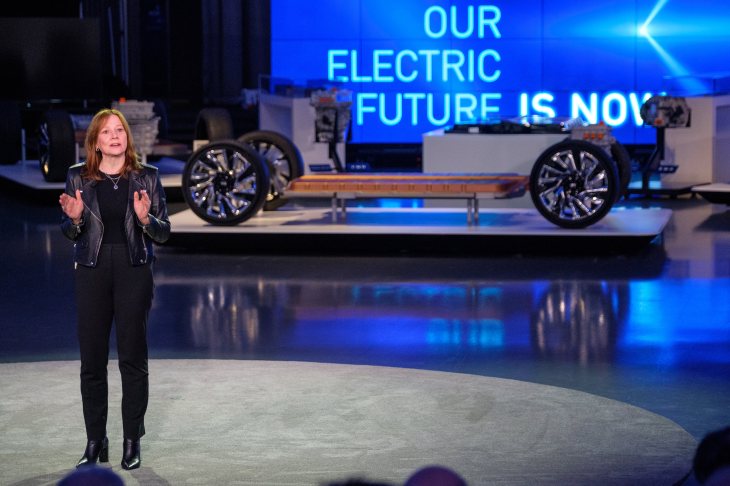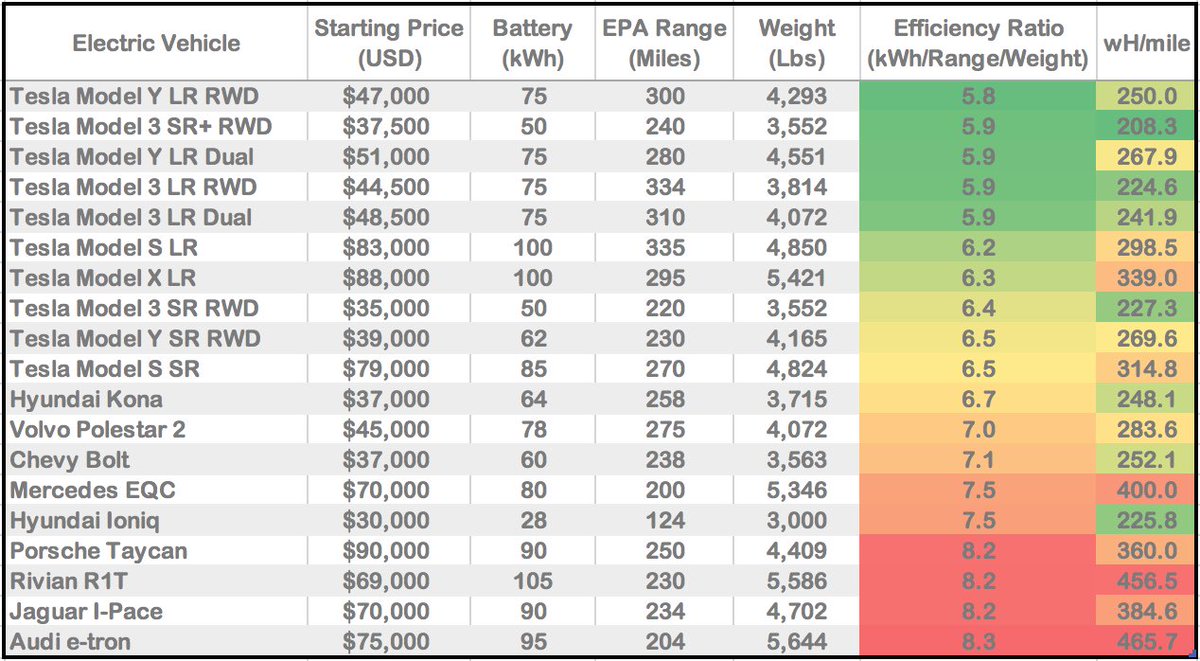BTW if you followed my tip on tesla stock last year, you would have tripled your money…
Yesterday General Motors gave a presentation about Electric Vehicles and how they were a big part of GMs future. They rolled out a long line of executives onto a stage to make passionately written (but embarrassingly delivered) speeches about how they were going to continue to be the world leaders in EVs. The CEO even wore a leather jacket. It was excruciating, but the presentation is not the problem. The problem is the facts, and the facts are harsh.

There is a very powerful attempt to drive down the price of tesla stock (an attempt that is failing, but nevertheless, well funded by oil companies). part of the narrative is that tesla is doomed because ‘competition is coming’. This was a claim first made when tesla produced the model S. It was repeated for the model X, then for the model 3, and the model Y gets released this week, and we are hearing it again. So far the claim has turned out to be bullshit, because 58% of EVs sold in the USA are made by tesla still. Thats bad enough, but the future is even worse for the ‘competition’.
There are a bunch of reasons why big legacy auto companies cannot compete, and they aren’t all obvious. I thought I’d list them here for anybody considering selling tesla stock and buying GM or Ford.
Software/hardware expertise
EVs are just TOTALLY different to conventional cars. The expertise in making petrol or diesel engines is useless when it comes to an EV. the actual body design has to be different too. Tesla puts the battery in the floor and the motors between the wheels, but trad companies are still putting the motors in the front because…thats where the engine used to go. This means zero front crumple zone, and no frunk storage, but they do it anyway. A bottom heavy car is safer, as it rarely (if ever) flips, but even now the big gas-car companies don’t get it. They are stuck in gasoline car hardware design mode.
Software wise its even worse. tesla make their own software, and are even now making their own self-driving AI chips. Thats right, they are designing the silicon for their cars in-house. Thats a crazy amount of expertise. Legacy companies instead use dozens of chips each from different manufacturers, with virtually no in-house software expertise, and have a nightmare hiring decent auto-experienced software devs, who all clearly want to work for elon musk.

BTW that self-driving chip is not just a prototype, they have been shipping it in cars for months already.
Factory Design
Teslas fremont factory used to be a legacy car factory and its a MESS in design terms. It was originally built to make ICE cars a long time ago, and is far from optimal design or layout for modern production. EVs require a totally different approach. This is why their chinese factory is built from scratch as a huge EV-only factory to produce super-modern cars. Legacy firms can’t demolish old factories and re-start, they have neither the time, money or the support of unions/governments to do so. Teslas 2nd purpose built factory (Germany) is breaking ground this month.
Workforce
Legacy auto is heavily unionized and unions HATE EVs. They have good reason to, as an EV is much, much simpler to build, and requires a much smaller workforce. A shift from legacy cars to EVs threatens jobs and the unions know it. Teslas workforce is, and always has been EV-only.
Dealerships
Tesla sells direct, but legacy is stuck with a dealership network they have to support for legacy cars. The dealerships HATE EVs, because so much dealership income is from maintenance and servicing, and EVS require almost none (My own EV has been serviced once in 4.5 years. Nothing was wrong). Also virtually nobody at any dealership knows anything about EVs. Consumer feedback from dealership visits is highly critical. often the customer knows more than the sale staff, who want to sell you an ICE car anyway. You are lucky if 1/10 cars in the ‘showroom’ is an EV anyway.
Late to market
Make that VERY late. Tesla made it clear EVs could be cool with the roadster in 2008. Then came the model S in 2012. Thats eight years ago. EIGHT years after the first mass-market electric vehicle, and the legacy auto firms are talking about delivering a certain number of cars in five years (optimistically). Its WAY too late. Many people already equate electric car with Tesla. 58% of USA EVs are Tesla. Their market lead is huge.

(BTW I didnt forget the Audi E-tron, Jaguar I-Pace and Nissan LEAF in that chart, they just dont even make the top 5… BTW this is not the end-game, tesla is still growing like crazy:

Batteries
Tesla make their own batteries in Nevada (and soon in China too). They partner (for now) with Panasonic to do this, but the tech is owned by tesla. They are the first company to go all-in on building a massive EV-battery production facility. other companies rely entirely on outside suppliers. Tesla have the best battery management technology in any EV. (See chart below),

If you want to work in EV battery research, its absolutely clear who you go to work for, and its not GM or Ford. Batteries are VERY expensive. Anybody can make a 400 or even 600 mile EV, you just have to put a staggering amount of batteries in it, but making an affordable 300 mile car is VERY hard, and its purely about battery tech.

Marketing
Tesla tout EVs as the future, and ICE cars as the past. They are right. Everybody knows it, but the legacy autos cannot say it. They make the overwhelming amount of their profit from ICE cars. Even GM admit that the bolt loses them money. They cant market their cars as the future or superior without admitting 99% of their lineup is inferior and the past. They HAVE to be pro-ICE cars because thats what they make, but in doing so, they have a conflicted marketing message. Meanwhile Teslas advertising budget is still ZERO dollars.
So to sum up..
Legacy autos have a workforce that hates EVS, assembled in factories designed for ICE cars, Their sales people hate EVS, and their hardware and software experience is minimal or actively damaging. They outsource the most important components, they are woefully behind, and their own product line prevents them from marketing EVs successfully.
TL;DR: Don’t believe the bullshit. The ‘competition’ for Tesla is fucked. There is way more chance that BYD or even Google/Apple could be a serious EV player than any of the old auto companies.